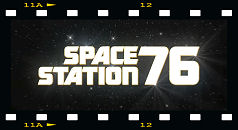 Jessica Marlowe arrives at space station Omega 76 to begin a tour of duty as the station’s second-in-command under uptight Captain Glenn, whose previous second-in-command left under mysterious (and much-gossiped-about) circumstances. She meets the station’s other personnel and spouses in rapid succession, including Ted and his wife Misty, the latter of whom has an oddly distant relationship with both her husband and their daughter, and Steve and Donna, both eager to move on to a better posting than Omega 76. Jessica, unable to have children of her own, quickly befriends Ted and his daughter, as Misty grows jealous of her presence. Glenn continually questions Jessica’s fitness for duty and her every suggestion, until she realizes that his relationship with her predecessor was more than just professional. She finds that her feelings for one of her new crewmates is entering that territory as well.
Jessica Marlowe arrives at space station Omega 76 to begin a tour of duty as the station’s second-in-command under uptight Captain Glenn, whose previous second-in-command left under mysterious (and much-gossiped-about) circumstances. She meets the station’s other personnel and spouses in rapid succession, including Ted and his wife Misty, the latter of whom has an oddly distant relationship with both her husband and their daughter, and Steve and Donna, both eager to move on to a better posting than Omega 76. Jessica, unable to have children of her own, quickly befriends Ted and his daughter, as Misty grows jealous of her presence. Glenn continually questions Jessica’s fitness for duty and her every suggestion, until she realizes that his relationship with her predecessor was more than just professional. She finds that her feelings for one of her new crewmates is entering that territory as well.
screenplay by Jennifer Elise Cox, Sam Pancake, Jack Plotnick, Kali Rocha and Mike Stoyanov
based on a stage play by Jennifer Elise Cox, Sam Pancake, Jack Plotnick, Kali Rocha and Mike Stoyanov
directed by Jack Plotnick
music by Steffan Fantini & Marc FantiniCast: Patrick Wilson (Glenn), Liv Tyler (Jessica), Matt Bomer (Ted), Marisa Coughlan (Misty), Kylie Rogers (Sunshine), Kali Rocha (Donna), Jerry O’Connell (Steve), Matthew Morrison (Daniel), Keir Dullea (Mr. Marlowe), Ryan Gaul (Chuck),
Victor Togunde (James), Jonny Jay (Trucker), Mike Stoyanov (Dr. Bot), Susan Currie (Steve’s Mom), Hart Keathley (Donna’s Baby), Anna Sophie Burglund (Star Angel), Sam Pancake (Saul), Katherine Ann McGregor (Janice), Julia E.L. Wood (Susan), Phillip Agresta (Crew Member), Kevin Beltz (Crew Member), Billy Brooks (Crew Member), Dan Burks (Crew Member), Melodi Hallenbeck (Crew Member), Marianne Heath (Crew Member), Matthew Horn (Crew Member), Shannon Jones (Crew Member), Alexander Koehne (Crew Member), Ilana Marks (Crew Member), Ken Koyasu Park (Crew Member), Jack Plotnick (Crew Member), Rachel Ward (Crew Member), Garrett Watts (Crew Member)
LogBook entry and review by Earl Green
Review: There was a lot of film festival buzz about how great this movie looked – the authentic retro-sci-fi set design and cinematography, the frozen-in-the-1970s costume design and hair, and so on. What there wasn’t a lot of film festival buzz about, however, was how funny Space Station 76 is. This omission is probably largely due to the fact that, despite all of the effort poured into the movie’s visual aspects, it’s awkwardly unfunny.
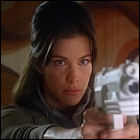 Space Station 76 crams as many stereotypical relationship problems and outdated “I’m OK, You’re OK” pop psychology as it can into a bottle, shakes it up, and pours it all over those sets. I would’ve been fine with a character dramedy that just happens to take place on a space station. Space Station 76, on the other hand, is what I’d expect if the script from a humdrum, unremarkable family drama of the ‘70s was lifted and dropped into a sci-fi setting, with the writers intent on trying to milk irony out of it that simply isn’t that funny. If the movie had been pitched as a drama, that would be one thing; the trailer clearly makes it out to be an Anchorman-style comedy.
Space Station 76 crams as many stereotypical relationship problems and outdated “I’m OK, You’re OK” pop psychology as it can into a bottle, shakes it up, and pours it all over those sets. I would’ve been fine with a character dramedy that just happens to take place on a space station. Space Station 76, on the other hand, is what I’d expect if the script from a humdrum, unremarkable family drama of the ‘70s was lifted and dropped into a sci-fi setting, with the writers intent on trying to milk irony out of it that simply isn’t that funny. If the movie had been pitched as a drama, that would be one thing; the trailer clearly makes it out to be an Anchorman-style comedy.
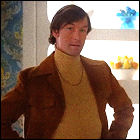 The movie apparently got a fairly tepid reception on the film festival circuit, and it’s easy to see why. The only laugh-out-loud line in the whole movie lands ten minutes before the end credits roll, and it’s hard to sympathize with any characters who aren’t the seven-year-old daughter of one of the crew couples, the station’s sole child. The only other character likely to be considered endearing is the robot psychologist, who provides not so much counseling as catchphrases based on keywords in whatever its patients say.
The movie apparently got a fairly tepid reception on the film festival circuit, and it’s easy to see why. The only laugh-out-loud line in the whole movie lands ten minutes before the end credits roll, and it’s hard to sympathize with any characters who aren’t the seven-year-old daughter of one of the crew couples, the station’s sole child. The only other character likely to be considered endearing is the robot psychologist, who provides not so much counseling as catchphrases based on keywords in whatever its patients say.
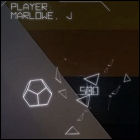 The costuming, setting, and occasionally ponderous pacing seems to be trying to parody nearly every major sci-fi specimen of the pre-Star-Wars ‘70s. Space: 1999, Silent Running, and Logan’s Run serve as visual reference points, as do the vector graphics of Atari’s Asteroids. But retro reference points don’t make a movie any more than effects and visuals make a movie. It also takes more than licensing Todd Rundgren and Ambrosia tunes to evoke the ’70s.
The costuming, setting, and occasionally ponderous pacing seems to be trying to parody nearly every major sci-fi specimen of the pre-Star-Wars ‘70s. Space: 1999, Silent Running, and Logan’s Run serve as visual reference points, as do the vector graphics of Atari’s Asteroids. But retro reference points don’t make a movie any more than effects and visuals make a movie. It also takes more than licensing Todd Rundgren and Ambrosia tunes to evoke the ’70s.
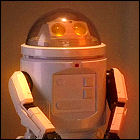 The initial buzz around this movie had me excited, as I’m sure it did many others: the intersection of “sci-fi” and “retro” seems to be happening more often as the genre’s multimedia footprint on the pop culture landscape gains maturity and wider acceptance. But that intersection will have to produce more interesting results than this.
The initial buzz around this movie had me excited, as I’m sure it did many others: the intersection of “sci-fi” and “retro” seems to be happening more often as the genre’s multimedia footprint on the pop culture landscape gains maturity and wider acceptance. But that intersection will have to produce more interesting results than this.
